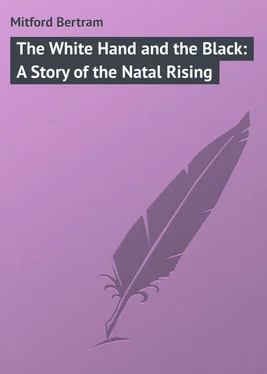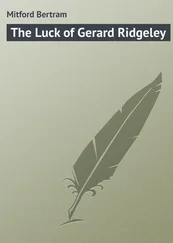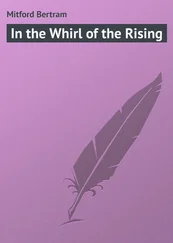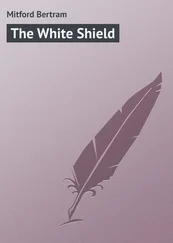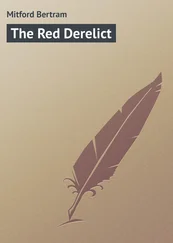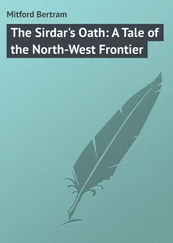Bertram Mitford - The White Hand and the Black - A Story of the Natal Rising
Здесь есть возможность читать онлайн «Bertram Mitford - The White Hand and the Black - A Story of the Natal Rising» — ознакомительный отрывок электронной книги совершенно бесплатно, а после прочтения отрывка купить полную версию. В некоторых случаях можно слушать аудио, скачать через торрент в формате fb2 и присутствует краткое содержание. Жанр: foreign_prose, на английском языке. Описание произведения, (предисловие) а так же отзывы посетителей доступны на портале библиотеки ЛибКат.
- Название:The White Hand and the Black: A Story of the Natal Rising
- Автор:
- Жанр:
- Год:неизвестен
- ISBN:нет данных
- Рейтинг книги:4 / 5. Голосов: 1
-
Избранное:Добавить в избранное
- Отзывы:
-
Ваша оценка:
- 80
- 1
- 2
- 3
- 4
- 5
The White Hand and the Black: A Story of the Natal Rising: краткое содержание, описание и аннотация
Предлагаем к чтению аннотацию, описание, краткое содержание или предисловие (зависит от того, что написал сам автор книги «The White Hand and the Black: A Story of the Natal Rising»). Если вы не нашли необходимую информацию о книге — напишите в комментариях, мы постараемся отыскать её.
The White Hand and the Black: A Story of the Natal Rising — читать онлайн ознакомительный отрывок
Ниже представлен текст книги, разбитый по страницам. Система сохранения места последней прочитанной страницы, позволяет с удобством читать онлайн бесплатно книгу «The White Hand and the Black: A Story of the Natal Rising», без необходимости каждый раз заново искать на чём Вы остановились. Поставьте закладку, и сможете в любой момент перейти на страницу, на которой закончили чтение.
Интервал:
Закладка:
Thornhill’s horse had been brought round, and as he got into the saddle Elvesdon turned away to the Court house. And the latter as he got there, felt as if he was treading on air. Yet why should he – why the devil should he? – he kept unconsciously asking himself.
Thornhill, passing the clerk’s quarters, saw the latter just coming out.
“Hallo, Prior!” he hailed. “Good-bye, I’m off.”
The young man came over to him.
“Good-bye, Mr Thornhill,” he said. “You don’t often look us up in these days.”
“You don’t often look me up, Prior, for the matter of that.”
“Oh well, Mr Thornhill,” said the other shamefacedly. “I should like to, you know. Er – may I come and try for a bushbuck someday?”
“Why of course you may, man, any mortal time you feel inclined, or can. By the way, how do you like your new chief?”
“No end. He’s – er – he’s such a gentleman.”
There was a world of admiration – of hero worship in the young man’s tone, and colonial youth is by no means prone to such.
“Ah,” replied Thornhill. “Well, I agree with you, Prior. Good-bye.”
Chapter Five.
The Ethiopian Emissary
The kraals of the chief, Babatyana, lay sleeping. So brilliant was this starlight, however, that the yellow domes of the thatch huts could be distinguished from the ridge – even counted. The latter operation would have resulted in the discovery that the collection of kraals, dotted along the wide, bushy valley, numbered among them some three hundred huts; but these, of course, represented only a section of the tribe over which Babatyana was chief.
It is a strange sight that of a large, sleeping kraal – or a number of them, in the wizard hush and calm beauty of an African night. It is so in harmony with setting and surrounding; the starlight showing up the ghostly loom of mountain, or suggesting the weird mystery of dark wilderness lying beneath, where deadly things creep and lurk. And then, these human habitations, themselves constructed of the grass which springs up around them, of the very thorns which impede the progress of their denizens, they stand, in primitive symmetry – not rude, because that which is circular is nothing if not symmetrical – lying there in their pathetic insignificance under the vast height of Heaven’s vault. And the said denizens sleeping there! Hopes and fears, virtues and vices; capacity for intrigue, cupidity; redeeming traits, human weaknesses – all the same, whether sleeping within the kraal of the savage to the lullaby of the voices of prowling creatures of the night, or in stately mansion amid the roar and rattle of the metropolis of the world. All the same – all, all!
The air is fresh and sweet with the fragrance of flowering shrubs, is faintly melodious with the ghostly whistle of circling plover invisible overhead. The cry of a jackal rings out from the hillside, receding further and further, to be answered again from another point in the misty gloom – then the bark of a restless dog in some slumbering kraal beneath. Or the hoot of a night bird hawking above the silent expanse, and the droning boom of a great beetle mingling with the shrill, whistling voice of tree frogs. Man is silent, but Nature never.
Along the ridge overlooking Babatyana’s kraals a dusty waggon road winds like a riband, distinguishable from the darker veldt in the starlight. It follows the apex of the ridge, and is just the place to avoid during those dry thunder-storms which in Natal seem to hunt in couples nearly every day during the hot months. Then the wayfarer may well leave the highway, and dive down into one of the bushy kloofs on either side, and wait until the turmoil passes; for the lightning will strike down upon that high, exposed pathway, every sheeting flash not much less dangerous than a shell from hostile artillery.
To-night, however, the elements are at peace, but man is represented by a single unit.
Natives, as a rule, are not given to wandering about alone at night, but this one is obviously here with a purpose. Like a statue he stands, gazing down the road as though on the look-out for something or somebody. He is a tall man, and ringed: and as he wraps his blanket closer around him – for there is a tinge of chill in the night air – and takes a few paces, it might be seen that he walks with a slight limp.
Another hour goes by, and still he stands, ever watchful, and suffering nothing to escape him, for the patience of the savage is inexhaustible. And now a glow suffuses the far horizon, widening and brightening; then the broad disc of a full moon soars redly aloft, and lo, the land is steeped in subdued unearthly light – plain, and ridge, and distant mountain, all stand revealed; and the clusters of domed huts in the broad valley beneath show out sharply defined. But these are no longer silent. First a low, long-drawn wail, then another and another from different points, culminating in still more drawn out howls, and the dismal sounds echo through the silence in weird cadence. Half the curs in the slumbering kraals are baying the newly risen moon.
Her light falls full upon the watcher, throwing out his tall form into statuesque relief, and glinting on the polished shine of his head-ring. But for the limp his gait as he slowly paces up and down would be a stately one. Even then there is an unconscious dignity about the man, as with head held proudly aloft, he gazes out over the moonlit expanse, and it is the dignity of a natural ruler of men.
Suddenly he stops short in his walk, and stands, listening intently. You or I could have heard nothing, but he can, and what he hears is the sound of hoof-strokes.
Down the road now he takes his way, walking rapidly, and soon the hoof-strokes draw very near indeed. Then he stops, and starts singing to himself in a low, melodious croon.
The horseman appears in sight, advancing at a pace that is half jog-trot, half canter. The moonlight reveals a thick-set, burly figure, encased in a suit of clerical black. But the face which now shows between the bow of the white “choker” and the wide-awake hat is not many shades lighter than the whole get-up.
“ Saku bona, Mfundisi ,” is the greeting of the watcher, whose singing, purposely turned on to guard against the horse shying or stampeding at the sudden appearance of anything living, has had that effect.
“ Yeh-bo ,” answered the other. “Do I see Manamandhla, the Zulu?”
“Of the People of the Heavens am I, Umfundisi ,” was the reply, but the tone in which the speaker enunciates the word “Umfundisi” – which means “teacher” or “missionary” – contains a very thinly veiled sneer. “The people down there have been awaiting you long.”
“In the Cause, brother, in our holy Cause, no man’s time is his own,” answered the horseman, sanctimoniously. “ Whau ! have not I been inoculating its sacred principles into the people at Ncapele’s kraal – or striving to, for Ncapele is old, and when a man is old enthusiasm is dead within him. It is the young whom we have to teach. Wherefore I could not turn my back upon him too soon.”
The speaker did not think it necessary to explain that the undue time it had taken to roast the succulent young goat which Ncapele had caused to be slaughtered for his refection had had anything to do with the lateness of his arrival. For that chief, although “a heathen man,” was not unmindful of the duties of hospitality. Which definition applied equally to Manamandhla the Zulu; wherefore the attitude of that fine savage towards the smug preacher to whom he had undertaken the office of guide, was one of ill-concealed contempt.
“And the people – the people of Babatyana,” went on the latter, “are they ready to hear the good news – the glorious gospel of light and freedom?”
Читать дальшеИнтервал:
Закладка:
Похожие книги на «The White Hand and the Black: A Story of the Natal Rising»
Представляем Вашему вниманию похожие книги на «The White Hand and the Black: A Story of the Natal Rising» списком для выбора. Мы отобрали схожую по названию и смыслу литературу в надежде предоставить читателям больше вариантов отыскать новые, интересные, ещё непрочитанные произведения.
Обсуждение, отзывы о книге «The White Hand and the Black: A Story of the Natal Rising» и просто собственные мнения читателей. Оставьте ваши комментарии, напишите, что Вы думаете о произведении, его смысле или главных героях. Укажите что конкретно понравилось, а что нет, и почему Вы так считаете.
